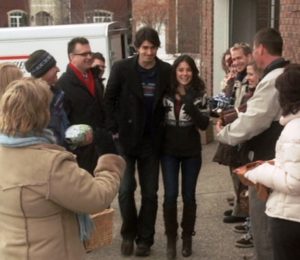 Oh my God. I am really growing to hate John McGiver. He was a very memorable character actor, but a little goes a long way. I remember liking him on an episode of Gilligan’s Island when I was a kid. Then decades later, I saw him in AHP’s Fatal Figures. That pace seems about right.
Oh my God. I am really growing to hate John McGiver. He was a very memorable character actor, but a little goes a long way. I remember liking him on an episode of Gilligan’s Island when I was a kid. Then decades later, I saw him in AHP’s Fatal Figures. That pace seems about right.
Unfortunately, he was just in The Bard yesterday, and is now in this episode. That incessant, crabby whining and moaning is killing me. Out of 268 episodes, this one is 263rd in IMDb’s newly-respected, formerly always-suspect ratings. [1]
 McGiver’s insufferable presence might have been forgivable in service of a decent story, but this ain’t it. The good news is, this is his final appearance on AHP. Oh well, let’s get this over with . . .
McGiver’s insufferable presence might have been forgivable in service of a decent story, but this ain’t it. The good news is, this is his final appearance on AHP. Oh well, let’s get this over with . . .
Arthur Motherwell comes home from his job at the funeral parlor and goes straight for the liquor cabinet, beating the viewers by about 5 minutes. After his third shot, his wife Rhoda asks him what the problem is. He pulls a note out of his pocket — department store magnate Stanton C. Barryvale has croaked. The only thing that could make this episode worse is a flashback.
 Oh, crap.
Oh, crap.
That morning, Arthur goes to work at the funeral parlor about 9 am. There he meets an attorney who is sadly not a client. He represents the Barryvale estate and wants Arthur to take care of the funeral.
Barryvale is wheeled in for his final layaway and Arthur is excited to work on such a local celebrity. He actually has a smile as he prepares to dig in. The attorney calls to inform Arthur of the requirements for the funeral — 30 limousines, a string quartet, a choir, orchids, accommodations for 300 guests, etc.
 As Arthur is washing his hands, Barryvale clears his throat and sits up on the slab. [2] Arthur explains that he is in the funeral parlor, having died the night before. Barryvale believes he was brought back from the dead to assure that his estate is not wasted on a lavish funeral.
As Arthur is washing his hands, Barryvale clears his throat and sits up on the slab. [2] Arthur explains that he is in the funeral parlor, having died the night before. Barryvale believes he was brought back from the dead to assure that his estate is not wasted on a lavish funeral.
Wait — he really thinks his heirs are going to squander the money on a lavish funeral rather than bury him in a pine box and head for the Porshche dealership after the service?
He wants the money to go to his various charities and foundations. Oh, OK — they might as well have a nice party if the rest of the loot is just going to be wasted on sick kids. That makes more sense. He tells Arthur to plan the cheapest possible burial — the titular six people and no music. [3]
 Arthur is distressed to hear this as he apparently would have made a tidy profit on the previous plan with the limousines and singers. Barryvale writes out instructions for his more austere funeral. Then he lays back down and dies again, conveniently on the slab.
Arthur is distressed to hear this as he apparently would have made a tidy profit on the previous plan with the limousines and singers. Barryvale writes out instructions for his more austere funeral. Then he lays back down and dies again, conveniently on the slab.
Dull story short, Arthur destroys Barryvale’s instructions and puts on the lavish funeral. Arthur and Rhoda go out to the theater.
Which is what I should have done tonight.
Post-Post:
- [1] I posted about 2 of the 5 episodes rated even lower than this one — The Legacy and The Hidden Thing. I don’t remember them being nearly this awful.
- [2] For a more pleasurable take on a stiff regaining consciousness on the slab, I direct you to After.Life. Christina Ricci awakens during her autopsy and, as I recall, was naked for about half the movie. Not be confused with the Night Visions episode After Life. And thank God, because Randy Quaid was the corpse in that one.
- [3] Six people and no music — Describe Mike Huckabee’s inevitable 2020 presidential announcement rally.
- Heyyoooo — I got a Carnac chill there.
- AHP Deathwatch: Joby Baker (Thor) is still with us.
- Teleplay by Richard Berg. His son is the author of several well-received books, A. Scott Berg. I can vouch for Lindbergh, which was great. But what’s with the “A”? E. Howard Hunt, G. Gordon Liddy, J. Edgar Hoover, L. Ron Hubbard, J. Fred Muggs — are these people (or a sub-human in at least one case) you want to be associated with?




 As great as Christopher Reeve was as Superman, there was a stiffness in his portrayal that wasn’t acting. He was able to exploit it for earnestness in Superman and add a comedic element to embody Clark Kent. Those are two fine achievements in a single film, but in other roles, that stiffness served no higher purpose. In that respect, Brandon Routh was the logical heir to the role.
As great as Christopher Reeve was as Superman, there was a stiffness in his portrayal that wasn’t acting. He was able to exploit it for earnestness in Superman and add a comedic element to embody Clark Kent. Those are two fine achievements in a single film, but in other roles, that stiffness served no higher purpose. In that respect, Brandon Routh was the logical heir to the role. Tracy wants to have their first child grow up in the suburbs. Some friends suggest they try The Commons. Well there was that thing where The Commons weren’t so welcoming when they thought the friends would have no more kids . . . but that was probably nothing.
Tracy wants to have their first child grow up in the suburbs. Some friends suggest they try The Commons. Well there was that thing where The Commons weren’t so welcoming when they thought the friends would have no more kids . . . but that was probably nothing. The next night at the homeowner’s association meeting, her husband is asked what the appropriate punishment for his wife should be. Apparently his choice was to have his wife stand in the town square in a pig mask and have garbage thrown at her because that is what Bobby witnesses the next day.
The next night at the homeowner’s association meeting, her husband is asked what the appropriate punishment for his wife should be. Apparently his choice was to have his wife stand in the town square in a pig mask and have garbage thrown at her because that is what Bobby witnesses the next day. Five years later, Tracy is the new HOA President. We see Bobby staring despondently at her through the window as she indoctrinates a new couple. The twist is that his legs have been amputated because he ran, but this ending seems botched in a couple of ways. It is revealed that he is in a wheelchair, then the amputation is revealed a few seconds later. I guess they were going for a
Five years later, Tracy is the new HOA President. We see Bobby staring despondently at her through the window as she indoctrinates a new couple. The twist is that his legs have been amputated because he ran, but this ending seems botched in a couple of ways. It is revealed that he is in a wheelchair, then the amputation is revealed a few seconds later. I guess they were going for a  “Broad-shouldered, big-muscled giant of a fellow” Tuffy Scott is standing in the stern of a row-boat. What is it with the row-boats lately? I’m pretty sure they had steam, diesel and the internal combustion engine in 1935.
“Broad-shouldered, big-muscled giant of a fellow” Tuffy Scott is standing in the stern of a row-boat. What is it with the row-boats lately? I’m pretty sure they had steam, diesel and the internal combustion engine in 1935.